Doing
Business
2020
Comparing Business
Regulation in
190 Economies
�
�
Doing
Business
2020
Comparing Business
Regulation in
190 Economies
�
© 2020 International Bank for Reconstruction and Development / The World Bank
1818 H Street NW, Washington, DC 20433
Telephone: 202-473-1000; Internet: www.worldbank.org
Some rights reserved
1 2 3 4 22 21 20 19
This work is a product of the staff of The World Bank with external contributions. The findings,
interpretations, and conclusions expressed in this work do not necessarily reflect the views of The
World Bank, its Board of Executive Directors, or the governments they represent. The World Bank does
not guarantee the accuracy of the data included in this work. The boundaries, colors, denominations,
and other information shown on any map in this work do not imply any judgment on the part of The
World Bank concerning the legal status of any territory or the endorsement or acceptance of such
boundaries.
Nothing herein shall constitute or be considered to be a limitation upon or waiver of the privileges
and immunities of The World Bank, all of which are specifically reserved.
Rights and Permissions
This work is available under the Creative Commons Attribution 3.0 IGO license (CC BY 3.0 IGO)
http://creativecommons.org/licenses/by/3.0/igo. Under the Creative Commons Attribution license, you
are free to copy, distribute, transmit, and adapt this work, including for commercial purposes, under
the following conditions:
Attribution—Please cite the work as follows: World Bank. 2020. Doing Business 2020. Washington,
DC: World Bank. DOI:10.1596/978-1-4648-1440-2. License: Creative Commons Attribution CC
BY 3.0 IGO
Translations—If you create a translation of this work, please add the following disclaimer along with
the attribution: This translation was not created by The World Bank and should not be considered
an official World Bank translation. The World Bank shall not be liable for any content or error in
this translation.
Adaptations—If you create an adaptation of this work, please add the following disclaimer along with
the attribution: This is an adaptation of an original work by The World Bank. Views and opinions
expressed in the adaptation are the sole responsibility of the author or authors of the adaptation
and are not endorsed by The World Bank.
Third-party content—The World Bank does not necessarily own each component of the content
contained within the work. The World Bank therefore does not warrant that the use of any third-
party-owned individual component or part contained in the work will not infringe on the rights of
those third parties. The risk of claims resulting from such infringement rests solely with you. If you
wish to re-use a component of the work, it is your responsibility to determine whether permission is
needed for that re-use and to obtain permission from the copyright owner. Examples of components
can include, but are not limited to, tables, figures, or images.
All queries on rights and licenses should be addressed to World Bank Publications, The World Bank
Group, 1818 H Street NW, Washington, DC 20433, USA; e-mail: pubrights@worldbank.org.
ISBN (paper): 978-1-4648-1440-2
ISBN (electronic): 978-1-4648-1441-9
DOI: 10.1596/978-1-4648-1440-2
Cover design: Bill Pragluski, Critical Stages
Library of Congress Control Number: 2019951789
�
Resources on the
Doing Business website
Current features
News on the Doing Business project
http://www.doingbusiness.org
Historical data
Customized data sets since DB2004
http://www.doingbusiness.org/custom-query
Law library
Online collection of business laws and
regulations relating to business
http://www.doingbusiness.org/law-library
Contributors
More than 15,000 specialists in
190 economies who participate in
Doing Business
http://www.doingbusiness.org/contributors
/doing-business
Entrepreneurship data
Data on new business density (number
of newly registered companies per 1,000
working-age people) for 156 economies
http://www.doingbusiness.org/data
/exploretopics/entrepreneurship
Ease of doing business score
Data benchmarking 190 economies to
the best regulatory practice and an ease
of doing business score calculator
https://www.doingbusiness.org/data
/doing-business-score
Rankings
How economies rank—from 1 to 190
http://www.doingbusiness.org/rankings
Data
All the data for 190 economies—topic
rankings, indicator values, lists of
regulatory procedures and details
underlying indicators
http://www.doingbusiness.org/data
Studies
Access to previous editions of Doing
Business as well as subnational and
regional studies, case studies and
customized economy and regional profiles
http://www.doingbusiness.org/reports
Methodology
The methodologies and research papers
underlying Doing Business
http://www.doingbusiness.org/methodology
Research
Abstracts of papers on Doing Business
topics and related policy issues
http://www.doingbusiness.org/research
Doing Business reforms
Short summaries of DB2020 business
regulation reforms and lists of reforms
since DB2006
http://www.doingbusiness.org/reforms
iii
�
�
Contents
vii Foreword
ix Acknowledgments
1 Overview
Tackling burdensome regulation
17 Chapter 1
About Doing Business
29 Chapter 2
The effects of business regulation
41 Chapter 3
Removing obstacles to entrepreneurship
57 Chapter 4
Employing workers
67 Chapter 5
Contracting with the government
77 Chapter 6
Ease of doing business score and ease of doing business ranking
87 Chapter 7
Summaries of Doing Business reforms in 2018/19
129 Chapter 8
References
Doing Business 2020 is the 17th in a
series of annual studies investigating
the regulations that enhance
business activity and those that
constrain it. Doing Business presents
quantitative indicators on business
regulations and the protection
of property rights that can be
compared across 190 economies—
from Afghanistan to Zimbabwe—and
over time.
Regulations affecting 12 areas of
the life of a business are covered:
starting a business, dealing with
construction permits, getting
electricity, registering property,
getting credit, protecting minority
investors, paying taxes, trading
across borders, enforcing contracts,
resolving insolvency, employing
workers, and contracting with the
government. The employing workers
and contracting with the government
indicator sets are not included in this
year’s ranking on the ease of doing
business.
Data in Doing Business 2020 are
current as of May 1, 2019. The
indicators are used to analyze
economic outcomes and identify
what reforms of business regulation
have worked, where and why.
v
�
�
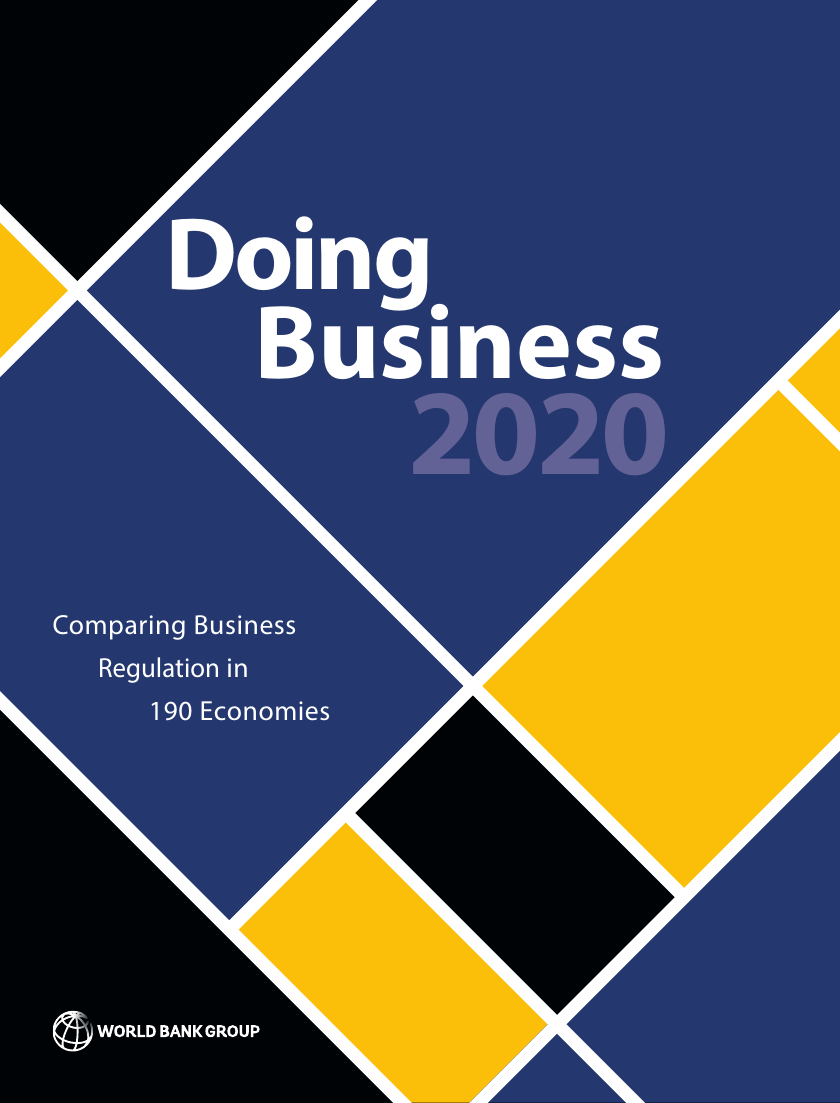

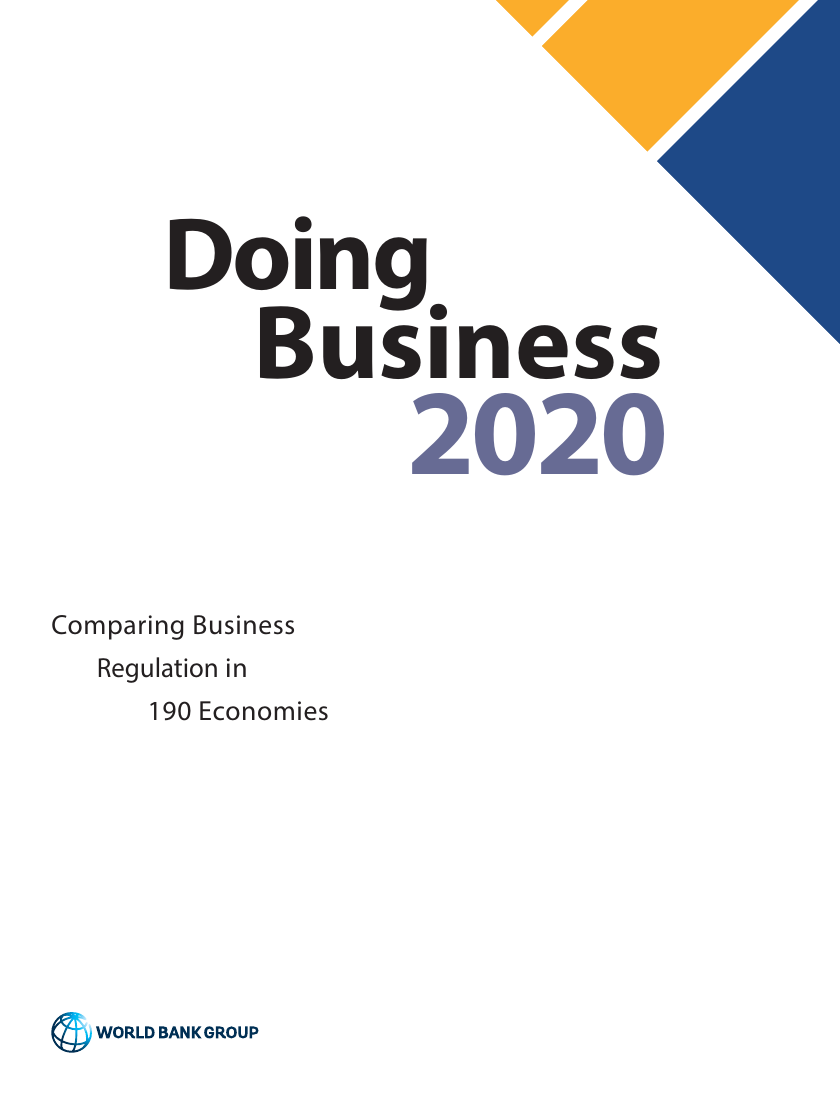
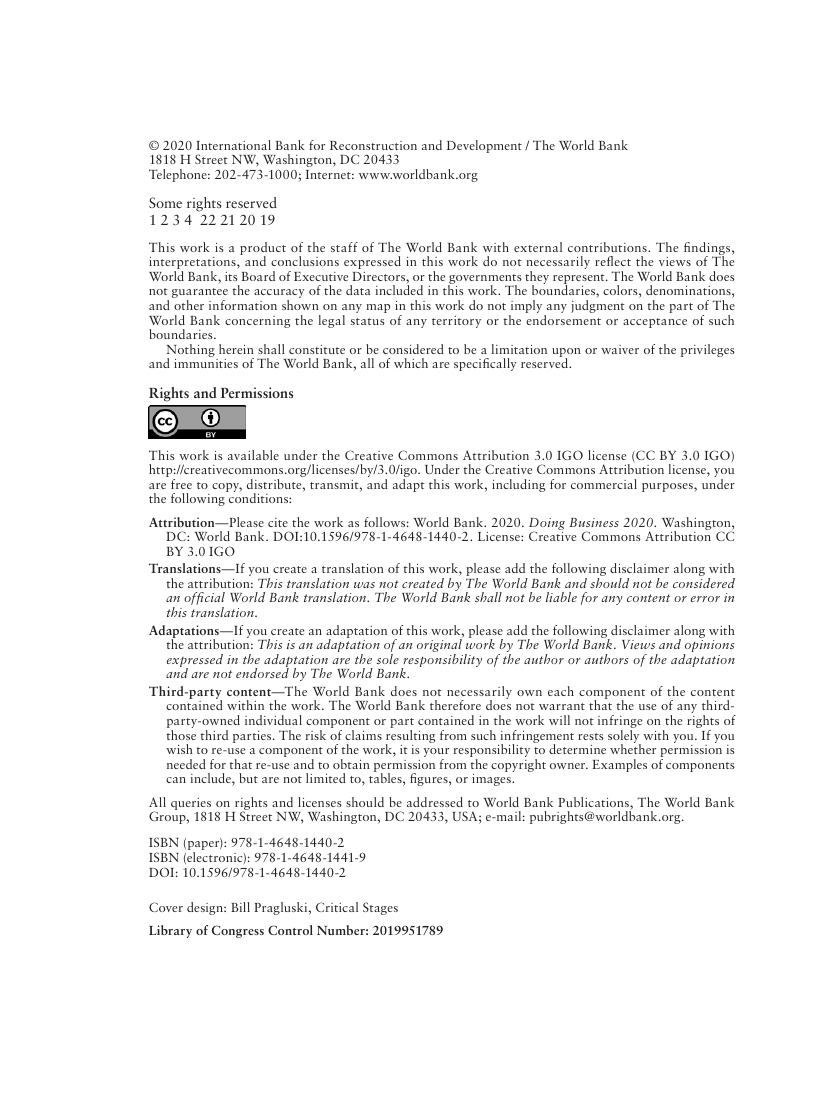
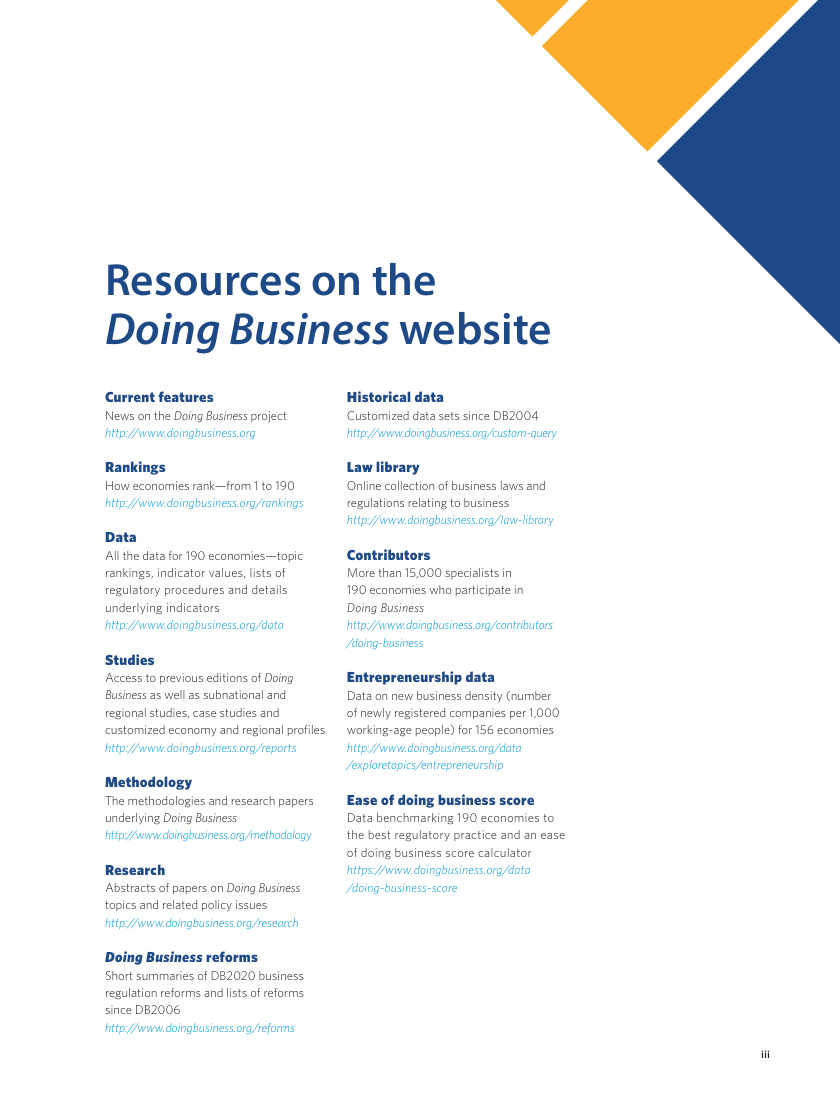

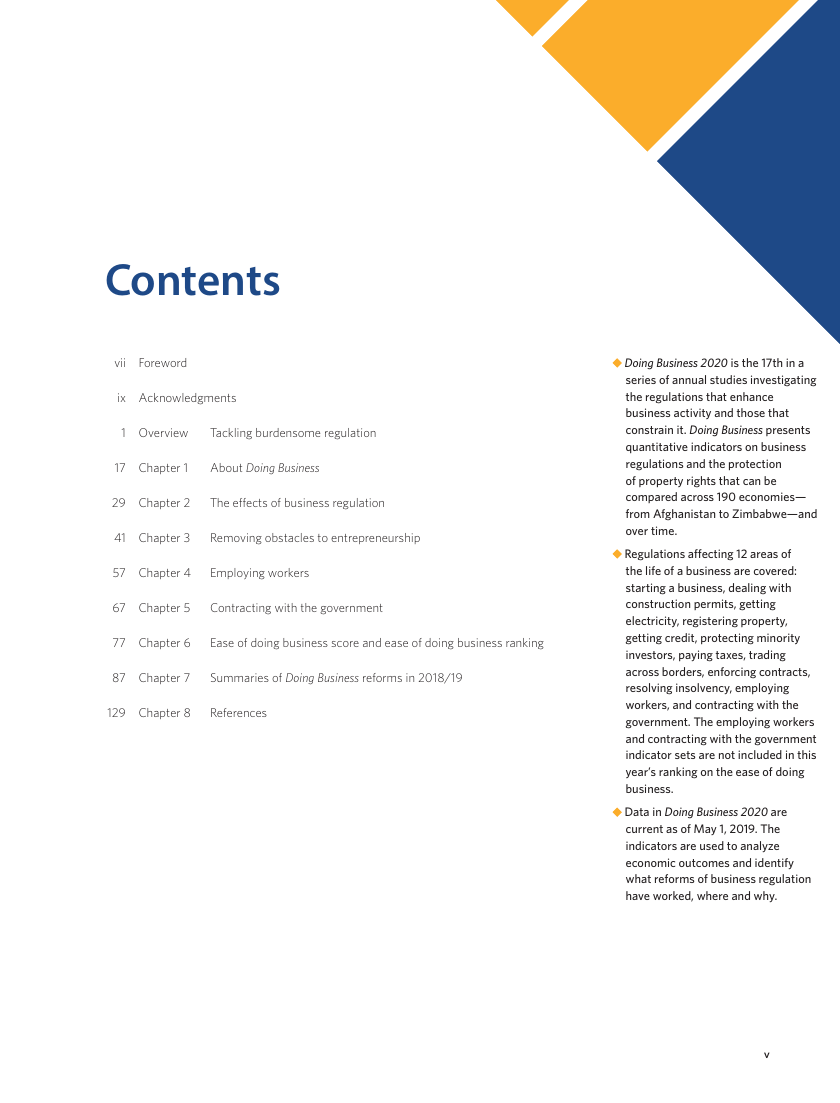









 2023年江西萍乡中考道德与法治真题及答案.doc
2023年江西萍乡中考道德与法治真题及答案.doc 2012年重庆南川中考生物真题及答案.doc
2012年重庆南川中考生物真题及答案.doc 2013年江西师范大学地理学综合及文艺理论基础考研真题.doc
2013年江西师范大学地理学综合及文艺理论基础考研真题.doc 2020年四川甘孜小升初语文真题及答案I卷.doc
2020年四川甘孜小升初语文真题及答案I卷.doc 2020年注册岩土工程师专业基础考试真题及答案.doc
2020年注册岩土工程师专业基础考试真题及答案.doc 2023-2024学年福建省厦门市九年级上学期数学月考试题及答案.doc
2023-2024学年福建省厦门市九年级上学期数学月考试题及答案.doc 2021-2022学年辽宁省沈阳市大东区九年级上学期语文期末试题及答案.doc
2021-2022学年辽宁省沈阳市大东区九年级上学期语文期末试题及答案.doc 2022-2023学年北京东城区初三第一学期物理期末试卷及答案.doc
2022-2023学年北京东城区初三第一学期物理期末试卷及答案.doc 2018上半年江西教师资格初中地理学科知识与教学能力真题及答案.doc
2018上半年江西教师资格初中地理学科知识与教学能力真题及答案.doc 2012年河北国家公务员申论考试真题及答案-省级.doc
2012年河北国家公务员申论考试真题及答案-省级.doc 2020-2021学年江苏省扬州市江都区邵樊片九年级上学期数学第一次质量检测试题及答案.doc
2020-2021学年江苏省扬州市江都区邵樊片九年级上学期数学第一次质量检测试题及答案.doc 2022下半年黑龙江教师资格证中学综合素质真题及答案.doc
2022下半年黑龙江教师资格证中学综合素质真题及答案.doc